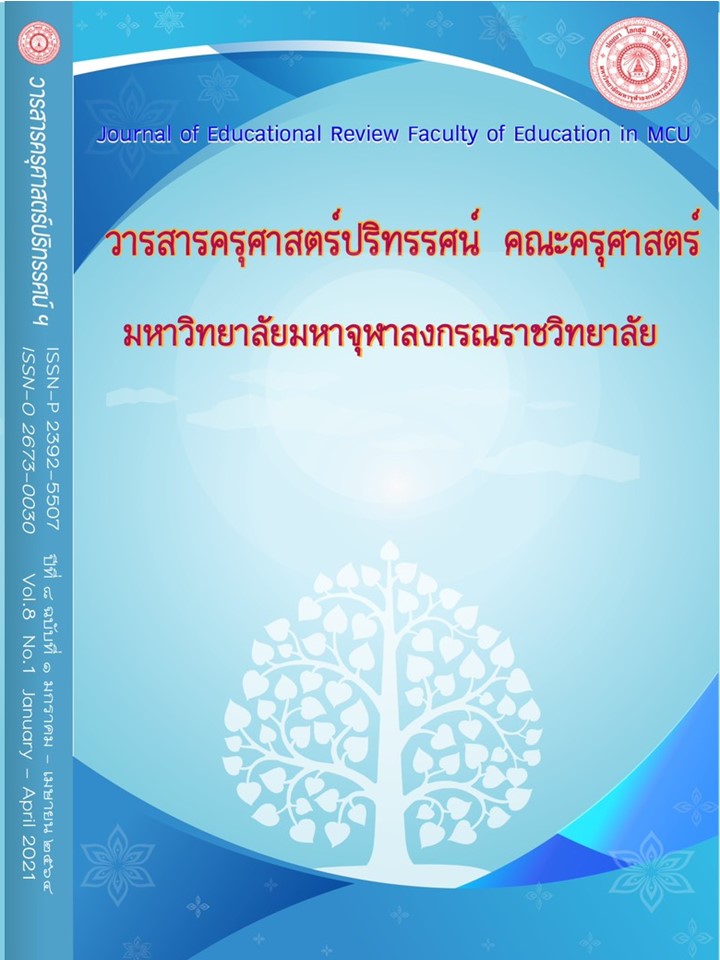EMPLOYEE’S LOYALTY FACTORS: THE CASE STUDY OF A JAPANESE – THAI MULTINATION COMPANY
Main Article Content
Abstract
The purposes of this study were as follows; 1) to examine the factors that make employee’s loyalty in organization, 2) to investigate the relationship between personal characteristics and employee’s loyalty factors, and 3) to find that what is the other factors that employee expectation from their organization and motivate them to more loyalty The population used in this research consisted of 31 current employees of a Japanese-Thai Multination Company. Mixed Methodology Research (Quantitative research and Qualitative research) were used to analyzed the data. A questionnaire was the instrument in this study, comprising closed-ended question, Likert matrix questions and in-depth Interview. The Statistical Package for Social Sciences program was used to analyze the data. The data received were analyzed by descriptive statistics [these were frequency, percentage, mean, and standard deviation], and inferential statistics [T-Test, and F-Test (One-way ANOVA)]. If the difference with pair-wise comparisons at 0.05 was found, the Least Significant Difference was used to determine the difference. The result of this research reveals that all factors affected their loyalty to the organization with agree level of overall engagement. The most factor that has mean of overall agreement with the employment benefits aspect having an effect on their loyalty to the organization was = 4.39 which were “agree level." The relationship between personal characteristics and employee’s loyalty factors, employees with different personal characteristics don’t have different opinions on factor that influent organization loyalty and status at 0.05 of statistical significance. The other factors that employee expectation from their organization and motivate them to more loyalty are family welfare, a chance for career growth and salary increase.
Article Details
ทัศนะและความคิดเห็นที่ปรากฏในบทความในวารสารฉบับนี้ถือเป็นความรับผิดชอบของผู้เขียนบทความนั้นเพียงผู้เดียว และไม่ถือเป็นทัศนะและความรับผิดชอบของกองบรรณาธิการ
กองบรรณาธิการขอสงวนสิทธิ์ในการคัดเลือกบทความลงตีพิมพ์และจะแจ้งให้เจ้าของบทความทราบหลังจากผู้ประเมินบทความตรวจอ่านบทความแล้ว
ต้นฉบับที่ได้รับการตีพิมพ์ในวารสารครุศาสตร์ปริทรรศน์ คณะครุศาสตร์ มหาวิทยาลัยมหาจุฬาลงกรณราชวิทยาลัย ถือเป็นกรรมสิทธิ์ของคณะครุศาสตร์ มหาวิทยาลัยมหาจุฬาลงกรณราชวิทยาลัย ห้ามนำข้อความทั้งหมดหรือบางส่วนไปพิมพ์ซ้ำ เว้นเสียแต่ว่าจะได้รับอนุญาตจากมหาวิทยาลัยฯ เป็นลายลักษณ์อักษร
References
Adedeji Abosede O. Ugwumadu Obianuju C. (2018). Factors Motivating Employee Loyalty and Employee Retention in Deposit Money Banks in Nigeria. International Journal of Human Resource Studies. 8(3).
Aityan SK. & Gupta TKP. (2012). Challenges of Employee Loyalty in Corporate America. Business and Economics Journal. BEG-55.
Aljayi, Y., Fjer, A., Guennioui, M., & Tamek, A. (2016). Multinational companies’ human resource management practices’ and their organizational culture impact on employees’ loyalty: Case of Japanese multinational company in Morocco. Procedia-Social and Behavioral Sciences. 230. 204-211.
Buchanan B. (1974). Building organizational commitment: The socialization of managers in work organizations. Administrative Science Quarterly. 19. 533-546
Creswell, J. W. (2009). Research design: Qualitative quantitative and mixed methods approaches. Los Angeles: Sage.
Herbert, H. G. (1972). The Management of Organization: A Systems and Human Resources Approach. 12th ed. New York: Appletion-Century-Crofts.
Hooi Lai Wan. (2013). Employee Loyalty at the Workplace: The Impact of Japanese Style of Human Resource Management. International Journal of Applied HRM. 3(1). 1-18.
Kamnerdkarn, Supapak. (2010). Factors that affect employee loyalty to an organization. Bangkok, Thailand. Dissertation (MSc) Language institute. Thammasat University. Vedoucí práce Associate professor Kusumal Rajatanun.
Likert, R. (1932). A technique for the measurement of attitudes. Archives of Psychology. 140. 5-53.
Mwangi, E. K. & Omondi, M. (2016). Factors influencing staff retention in the banking industry in Kenya: A case study of Equity Bank Limited. The Strategic Business and Change Journal of Management. 3(20). 428-454.
Porter, L. Steers, R. Mowday, R., & Boulian, P. (1974). Organizational commitment, job satisfaction, and turnover among psychiatric technicians. Journal of Applied Psychology. 59. 603-609.
Sekyi, E., Boakye, N. A., & Ankumah, F. J. (2016). Analysing the factors influencing employee loyalty in the hotel industry in Takoradi, Ghana. Journal of Tourism. Hospitality and Sports. 18. 44-49.
Thanasdh Kasemchaiyanandh. (2001). The factor that effect web sites accessing behavior of users in Bangkok. (Master Thesis). Thammasart University.
Rap Nawaz Lodhi, Muhammad Sajid Tufail, Anam Iqbal. (2015). Employee loyalty and organizational commitment in Pakistani Organizations. Global Journal Of Human Resource Management. 3(1). 1-11.
Siriwan Sereerat et al. (2007). Customer behavior. Bangkok: Theera Film & Scitex Co. LTD Press.
Uzma, W. A. (2015). Impact of training on employee’s performance. Business Management and Strategy. 6(1). 49-64.


